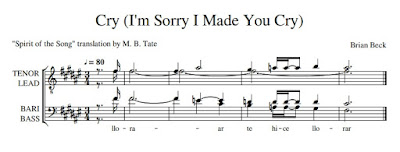My mission: to harmonize the world. Writings on music, coaching, social critique, sportsball, language, the pursuit of knowledge and wisdom, comparative/international education, voice work, and biographies. Nullius in verba. Twitter: mapnmuzikman
Monday, May 10, 2021
Harmony is for Everyone
This is one of the greatest barbershop quartets of all time.
"But, Michael, I thought barbershop quartets were men."
Not always, dear reader. In fact, often not.
Sandi Wright herself once graced me with the chance to sing the tag (what's a "tag"? see previous blog post, Harmonizing the World: The First Falling Pebbles) from this song. I cherish this memory!
Wherever you are on the gender spectrum, barbershop is for you.
But, I'll be frank; I didn't always enjoy women's quartets. My only saving grace is that my mind was open enough to receive new data to change my mind. Four years ago, I got to watch a master barbershop coach work with The Ladies. Beautiful sound. Fabulously cohesive group. They opened my eyes and my heart to women's barbershop. They even inspired me to write a tag specifically in a key for "women's" (in the loose sense of the word; gender is a spectrum, of course) voices. It's called "Bittersweetness". I should probably try to generate a Spanish version now, too, huh?
Sunday, May 9, 2021
Why Do We Insist on Making Learning Music Hard? Episode One
Now, try to explain why, in 2021, we aren't printing/displaying sheet music such that the frequency spaces between notes are more to-scale.
Seriously.
It's time.
We ask new singers and new musicians to overcome this pretty-glaring issue of inaccuracy.
"How far up do I go from a C to the note on the next line?", they might ask.
Well, it depends on the key", we say.
WHY???
Why can't we just pinch the lines in for the half-step distances? Surely, we have the technology to do this. The graph-that-is-the-staff should be to scale!
...
...
Now, the barbershopper in me also believes that it wouldn't kill us to do this for chords, too, but there are different schools of thought on whether you harmonize to the melody or to the key. So, for now, making the musical scale a more accurate graph, and thus more intuitive for learners, would be a nice start.
Harmonizing the World: the First Falling Pebbles
If you're familiar with some music terms (and even if you're not), a barbershop "tag" is a coda.
Within Barbershop culture, there is an entire sub-culture comprised strictly of learning and singing tags (there is also a social component).
It took me a couple of years to start to get why people loved tags. I'm going to save you the trouble.
Not an exhaustive list, but this will get you started:
It's almost akin to learning/singing the gist of the entire song. Efficiency!
Arrangers often put the coolest chords into the tags.
You can switch and sing multiple parts.
You get to practice little techniques you've been working on, and putting them into a semi-complete context.
As a teaching vehicle, tags allow a coach/director to provide many opportunities... Give singers chances to have their first taste of quarteting; show the learners that they can do all of the above; develop learning-by-ear skills... And so many more.
Having shown this, you can see part of why I think tags could be a great vehicle to bringing the spirit of harmony around the world: efficiency.
But, there are thousands of extant languages, so how can a barbershopper like me reach out to other people in the world? If I expect them to sing in U.S. English, they're likely to be less comfortable. So, we make versions of the tags in their language! :)
Enjoy the first pebbles!
~Michael
Friday, April 30, 2021
Comparative Education, Music-style
There would be so many benefits.
But, the way the job market is, I doubt there's anything available.
So, it falls to me to do the work here. At the least, it'll be fun and I'll learn things.
And it'd give me some samples to send to companies in case they need someone.
Friday, March 5, 2021
Coaching Wisdom in the Trenches
We can talk all day about teaching methods and their efficacy (and there are gobs of good ones), but those are supplements.
I enjoy an advanced discussion as much as the next nerd, but, when it comes to coaching, I like being in the trenches.
In my tutoring experience, I have loved the challenge of trying to change people's minds about subjects I love.
Think about your field. If you love it, you want more people to love it. Of course you do. So, we should teach to clone our love. We should love the learners. Everything else flows from these two principles. We want the learners to stay connected to our subjets long after they have ceased accepting our services. It does less good to focus primarily on the immediate. Our goal is to maximize their potential, and, as we all know, that means delayed payoff sometimes.
For example, I've been studying music formally since 2003 and I feel like I am only just now beginning to round out. My music teachers best accomplished the payoff of avoiding harm. This is to say that I feel like I might have learned more if I had been more motivated to practice. Still, my teachers never made me feel like I wasn't good enough ... that I couldn't learn. Hence, to this day, I keep getting incrementally better. Michael Tate is a near-master's graduate in Adult Learning and Leadership. He directs a men's barbershop harmony chorus.






